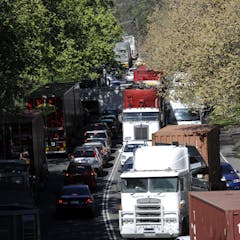
Articles on Urban transport
Displaying 61 - 80 of 94 articles

The UK pioneered smart cards such as Oyster. But now, experimentation is being stifled as cash-strapped councils struggle to deliver basic services.

Old people in Nigeria’s cities can’t even rely on public transport.

It might not be effective now, but the development of self-driving vehicles could be a game changer for public transport services.

Trains and trams get most attention, but ‘tweaking’ bus transit can transform cities. Buses can be more cost-effective and deliver better service, especially for small to mid-sized cities.

The relationship between weather and our travel choices is complicated. We can’t change the weather, but, with many other factors in play, good policy and design can reduce its impacts.

The congestion charge has helped to ease traffic and raise funds. But the rise of Uber and other private hire vehicles have raised unforeseen challenges.

If the strategies we put in place to make cycling safer were taken up in earnest the result would often be chaos.

Choreographers could offer engineers tools to stimulate new ideas in city-making.

The evidence suggests a small investment in cycling infrastructure, combined with less punitive policing, would enable more Australians to escape daily traffic congestion.

Tokyo has experienced extraordinary population growth but is among the world’s most liveable cities. Just how has it managed the pressures of growth?

For Melbourne drivers who comfort themselves with the thought that traffic congestion is worse in Sydney, sorry but new analysis shows overall delays are similar, but some commutes are especially bad.

Estimated cost savings for rail and bus franchising from Infrastructure Australia and PwC will have government treasurers salivating. Problem is, the figures are almost certainly far too high.

Justifying Sydney’s ranking as a liveable city requires greater recognition of the inequality of Sydneysiders’ access to jobs, wealth, transport and housing.

There’s every chance that, if mismanaged, driverless vehicle technologies will entrench the ills of car dependency.

A new study shows that restaurateurs would be better off advocating for better public transport access to their precincts rather than for more parking.

Long-term privatisation contracts, most of them closed to scrutiny, lock urban infrastructure into 20th-century formats unsuited for a climate-threatened planet.

Politicised transport projects that flout proper process lead to hostility between residents and governments, and give planners a bad name.

A project set up north of Melbourne’s CBD aims to create a living laboratory for developing a highly integrated, smart, multimodal transport system.

Perth’s Roe 8 project illustrates all that is wrong with how we are planning and managing infrastructure in our cities.

Roads versus public transport: for decades, these have been the battle lines in debates over transport in our cities. But a revolution in mobility is under way that will transform our thinking.





